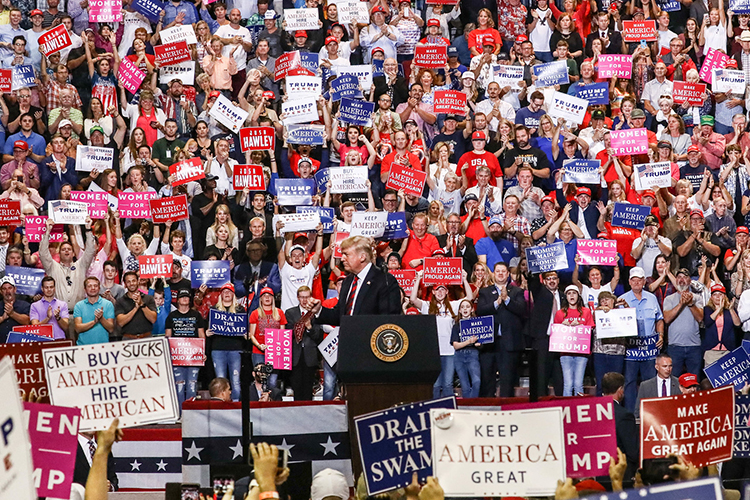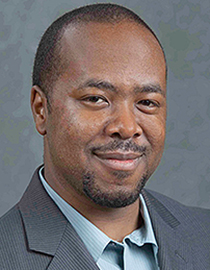
In a deeply divided nation, the 2020 election may produce a government unable to act effectively on critical issues such as the COVID-19 pandemic, the damaged economy, the crisis in racial justice and climate change. (Photos by Gage Skidmore via Flickr | CC BY-SA 2.0)
Nearly two days after the polls closed, Democrat Joe Biden appeared to be inching toward victory in the U.S. presidential election and Republicans seemed poised to retain the Senate. If those trends hold, the ultimate result of a campaign forged in crisis may be a government more divided than ever, all but paralyzed by partisan warfare.
In a series of interviews, UC Berkeley scholars described the election and its apparent outcome as reflections of deepening national division, a political landscape where, increasingly, issues matter less than identity. The division has sobering implications across a range of existential issues: the COVID-19 pandemic, race relations in an increasingly diverse society, climate change - and the health of democracy itself.
Several expressed surprise at the outcome. Pre-election polls had suggested that the federal government's failed pandemic response, the economic collapse and a crisis of police violence and widespread protests would drive a Blue Wave in favor of Democrats, transforming national politics.
"One would have thought those are the kind of events that in normal American political history would affect the president's ratings quite a bit," said political scientist Eric Schickler, co-director of Berkeley's Institute of Governmental Studies. "And they have, to some extent. But this may be the new normal in our politics, the new abnormal, where it's so polarized and tribal that there is much less room to move people (from their established opinions)."
That has troubling implications for an increasingly diverse society, said law professor Ian Haney López, an influential scholar and author in the areas of race, law and politics. "There was no Blue Wave. We have not transcended the basic divisions. There was no resounding repudiation of racial division, of the intentional fear-mongering. The polling suggested that there might be, but there wasn't."
Even if Biden ultimately wins, they said, deep divisions remain - not just in the balance of power in Washington, D.C., but in communities across the nation. With dialogue broken and trust in short supply, issues such as climate change, health care and income inequality may be difficult or impossible to address. If the current mood is any indication, even civil discussion may be a challenge.
The divisions may be so significant that they put the health of democracy in question, contributing to the erosion of democratic standards that political scientists call "democratic backsliding." Could a win by Biden forestall the flirtation with illiberal populism and white nationalism that has been a feature of the United States under the Trump administration? That remains to be seen.
"As someone who wants the U.S. to remain a democracy, I did want to see a repudiation of authoritarian-leaning politicians across the United States," said political scientist Susan Hyde, an expert in democratic backsliding. But, she said, "that was something we haven't seen as clearly as I was hoping for."
A legal path to survival?
Trump claimed victory Tuesday night, though no election authorities backed his claim. Wednesday, as Biden's lead widened, Trump escalated his allegations of fraud, but offered no proof. Later in the day, his campaign claimed to have won the crucial state of Pennsylvania - again, falsely.
The campaign also pressed a legal case to challenge the outcome. And while the momentum seemed to be against the incumbent, Erwin Chemerinsky, dean of Berkeley Law, did not rule out scenarios in which Trump could bring his case before the Republican-dominated U.S. Supreme Court.
"President Trump has made clear that he will do all he can to hold on to the office and bring whatever legal challenges he can that might help him," Chemerinsky said. "It is hard to know what the issues will be, at this point, and what the court might do."
What happens next is likely to play out in a volatile climate over the coming days and weeks before the Jan. 20 inauguration.
Democracy and the challenge of American tribalism
The 2020 vote followed a season of extraordinary turmoil - the impeachment of Trump last winter, the failure to control the pandemic, economic contraction, jarring police violence against people of color and also those protesting the violence. The Republican campaign featured systematic efforts to suppress votes by people of color and a daily blitz of disinformation.
By some measures, democracy offered a robust response: Bloomberg News Service projected that turnout could approach 165 million voters, or 72% of the citizen voting-age population. That would be unprecedented since 1900.

U.S. Senator Kamala Harris, center, is poised to be the first woman, and the first person of color, elected to the U.S. vice presidency. In this pre-pandemic photo, she is with U.S. Rep. John Lewis (right), the late civil rights icon, at the historic Edmund Pettus Bridge in Selma, Alabama. (Photo via Twitter via the Office of Senator Kamala Harris)
Biden won more votes than any candidate in U.S. history. And California Sen. Kamala Harris appears poised to become the first woman, and the first person of color, to be elected vice president.
Despite this potential milestone, Berkeley scholars said, racial divisions appear to have grown deeper, with Americans polarizing into a hardened and sometimes threatening camps, especially on the right. Even mainstream conservative culture is increasingly characterized by the rejection of science, embrace of wild conspiracy theories and acceptance of militant, far-right militias. That drift is reinforced by what Hyde called "disinformation bubbles" in the right-wing media.
Tribalism is a useful metaphor for the moment, said Berkeley political scientist Paul Pierson. The conflicts are largely geographical - America's rural regions versus its metropolitan regions, with divergent political, cultural and religious values. Different media sources and habits shape attitudes on issues like abortion, climate change, civil rights and gun rights.
"People have their minds made up about this stuff," Pierson said. "They have their minds made up about whose side they're on. Reality is not going to move that very much, for most people."

Intense loyalty binds loyalists to President Donald Trump, and the tribalism may be reinforced by racial hostility and "disinformation bubbles" in the right-wing press, Berkeley scholars say. (Photo via Flickr by Charlotte Cuthbertson/The Epoch Times | CC BY-NC 2.0)
White loss and white grievance
Much of the new populism is driven by fundamental forces that are changing the economic and cultural roles of white men in American society, said sociologist Raka Ray, dean of social sciences at Berkeley.
"We've departed, in the past few decades, from a system where the white working class man was relatively privileged," Ray said. In that economic system, "a man could earn a wage that would support his entire family. He could look forward to the next generation doing better. But women, African Americans, immigrants - they were excluded from this family wage compact."
Today, many of those jobs have been lost to automation or, in some cases, to emerging countries, such as China and Mexico.
Median income for white men has been flat since the 1980s, Ray explained. For Black men, income has risen modestly, while it has nearly doubled for white women and more than doubled for Black women. Any increases in income for white men has gone mainly to the wealthy.
Democrats have been the strongest advocates for increasing opportunities for people of color and for women, said Haney López. At least partly as a result, no Democratic president since Lyndon B. Johnson in 1964 has won a majority of the white vote. Trump, as of Wednesday afternoon, had a 15-point lead over Biden among white people.
Polling had indicated that whites in the suburbs and older whites were moving away from Trump. Instead, early numbers showed support for Trump among white women rising by more than 8%. The gender gap in support for Trump "virtually disappeared," Haney López said.
"The consolidation in white support for Trump - that's the biggest underreported story right now," he said. "That's the big news."
Seen through a Republican lens, competition for jobs and wealth is like a competition among teams, said law professor Bertrall Ross, an expert on the U.S. Constitution, vote suppression and democracy. And that's why Republicans can gain traction with white voters when they accuse even moderate Democrats of being socialists.
"The socialism that they're referring to is redistribution of wealth along racial lines," Ross explained. "There's a sense that you're taking away from white folks and giving it to people of color, which builds up this racial resentment that further solidifies the team."
"That sort of construction … explains why 2020 doesn't look that much different from 2016" in voter support for Trump, Ross said.
The way forward: Is there hope?
The challenge confronting all Americans is how to break this cultural logjam - a sort of low-grade civil war - in a way that settles conflict constructively.
Haney López advocates a shift by Democrats and their progressive allies toward a strategy that brings working class people of all colors together, in opposition to interests of the ultra-affluent class.
Pierson suggested that, if Democrats had won the Senate, a period of systemic change might have been possible, taking advantages away from conservatives. That, in turn, might have forced Republicans to reconsider their strategy.
Instead, he and others agreed, the nation may be headed for a period of paralysis and bitter conflict, though perhaps under Biden's more sunny nature.
"We're in for trench warfare," Pierson said.
But Hyde, the expert in democratic backsliding, takes hope in a lesson from Civics 101: Despite profound tension, Americans are still working to settle their differences - not with violence, but with votes.
"Yes, we have a ton of problems," she said. "We are facing unprecedented sets of issues and a reckoning about race that has been a long time coming. … But my hope is that maintaining democracy and maintaining periodic elections is still going to be a more peaceful way of having that reckoning and dealing with the divisions that are inherent in a country as large and diverse as the United States."












